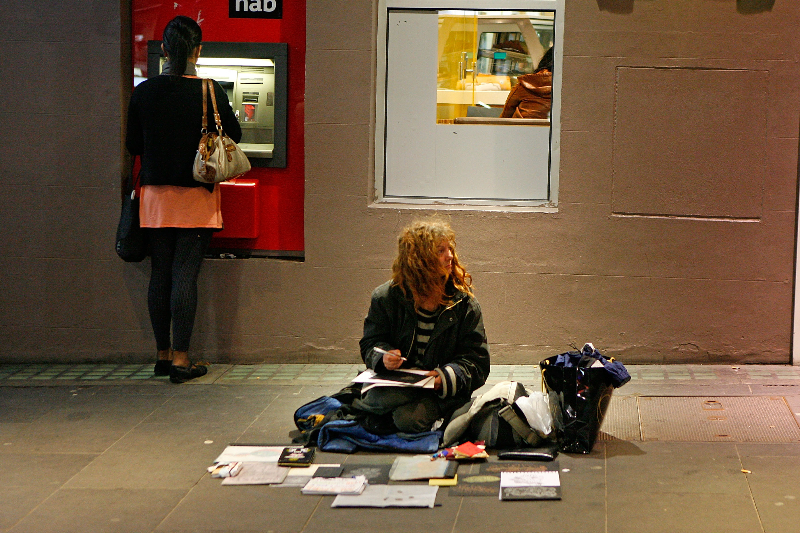When you put rising housing costs alongside stagnating wages, an alarming trend in normalising insecure work, persistent unemployment and underemployment, and statutory incomes that are going backwards in real terms, there’s good reason to be deeply worried about an increase in homelessness.

Late last year, Everybody’s Home, the national campaign to end homelessness, commissioned research by Equity Economics, showing that homelessness could surge by 9 per cent this year. In marking Homelessness Week last week, Homelessness Australia released data showing that cuts to social housing funding and homelessness services over the last ten years will soon exceed $1 billion.
At the same time house prices have gone up by 50 per cent and rents by 31 per cent. In fact, a recent Per Capita paper, Generation Stressed: House Prices and the Cost of Living in the 21st century, by Matt Lloyd-Cape, shows that from 1970 to 2000 the cost of owning a home rose by a whopping 130 per cent.
Covid has taught us much about how things really stand. And how they so easily fall! We have learned that yesterday’s relatively secure job can easily become today’s precariously insecure job and today’s insecure job can become tomorrow’s application for a JobSeeker payment. Parallel to this trajectory, of course, today’s mortgage or rental might easily become tomorrow’s default or eviction.
Covid has driven home the interconnectedness of things. We are seeing how there are connections that have previously gone unnoticed, not just between policies, but between ourselves!
You can’t keep society going without working people. We’ve noticed that the people we tend to refer to as ‘essential’ are often actually amongst the lowest paid and the most insecurely employed. We’ve noticed that you can’t do public health if you haven’t ensured that people have safe housing. And that if we can’t expect someone who has just lost their job due to the pandemic to live below the poverty line on JobSeeker, then how can we expect anyone else to?
'Homelessness is caused, not by poverty, but by wealth, especially speculative wealth, concentrated in the hands of the few, to the detriment of the many.'
We've noticed the gentle ease of a society rich in the kindness of strangers. We’ve noticed that many of the people we’d taken for granted, workers who clean our hospitals, who produce or process or pack or transport our food, who serve us in supermarkets, who nurse us, who teach us, who help us out, who keep the lights on, workers who are not highly valued by capitalism, people that some of us had been taught to unsee, are precisely the people we’d be lost without.
And that many of those who hold political power or economic privilege are precisely those we can do without. We can, for example, do without those who have no qualms about hanging on to generous corporate welfare while raking in the pandemic profits. And we can do without those who frame legislation in such a way that this is actually encouraged and allowed. We can do without those, whether in government or in the corporate sector, who praise essential workers one week and then strip their wages and conditions, or indeed their jobs, the next.
We’ve not only seen our lives turned upside down, we’ve seen policies being rolled out that many of us had longed for and had never given up fighting for, but which would not have happened in ‘normal’ circumstances.
We saw the unprecedented, albeit all-too-short-lived, doubling of the JobSeeker payment. We’ve seen accommodation being provided to rough sleepers. We saw a job subsidy implemented, albeit one which the Morrison government had to be dragged kicking and screaming by the ACTU to agree to. We saw a brief period during which early childhood education was made available freely. And now we are (gradually!) seeing a nationwide public health intervention in the shape of mass vaccinations.
Pretty much every one of these policies and programmes have been done in ways that invite criticism. The Coronavirus Supplement for people experiencing unemployment was brilliant while it lasted but was then completely withdrawn, pushing people back below the poverty line. JobKeeper saved jobs and kept households out of poverty, but it was structured in such a way that permitted companies that did not need it to take it and keep it despite chalking up significant profits, and it excluded significant sections of the workforce from any means of support. And it too was withdrawn far too early.
.png)
The accommodation for rough sleepers was, in some places, impressive, and showed that governments really can end homelessness, but if you know that your accommodation, no matter how good it is, is short term and insecure you can't really say you’ve got a place to call home. The brief dalliance with free early childhood education was… brief. Can’t be getting too socialist now, can we! It also failed to address the underlying structural problem of inadequate wages for early childhood educators. And the roll-out of the vaccine has been so poorly managed by the Morrison government that it may well end up being the chief reason why it may lose the next election.
But still, we’ve been given a glimpse of what can be done when the pressure is there.
Labor has also given us a glimpse of something we haven’t seen for a very long time, namely a commitment to a Full Employment framework, with Anthony Albanese signalling that this would be an incoming Labor government’s first White Paper. Again, this is something that many of us have been fighting for over many years, with little appetite previously being shown by political leaders for this common sense approach, not since the framework developed in the Curtin government’s 1945 White Paper on Full Employment was systematically dismantled by the harbingers of neoliberalism in the 1970s.
Which all goes to show that the economy is not some kind of magically invested entity that floats somewhere above us, controlled by an invisible hand and moved by the 'animal spirits of capitalism' which the prime minister is curiously reverential towards. The economy is a political struggle.
We cannot return to the pre-neoliberal period. We can, however, prepare a way forward that delivers a strong and proud architecture for a social guarantee, including a place to call home for everyone, jobs that we can rely on, well-funded public health and public education, and a respectful, rather than demeaning, mode and level of income support for whoever needs it.
Democracy should mean so much more than a vote every few years. It should also encompass our means of economic decision-making, the democratisation of our public sphere, rather than its rampant privatisation and constriction, the recognition of the socially crucial role played by workers who organise themselves collectively into unions, the unapologetic uprooting of patriarchal power and the gender inequality and gendered violence that is its hallmark, and, at the very heart and as the very foundation of a democratic renewal, the implementation of the structural reform called for in the Uluru Statement from the Heart.
Homelessness is caused, not by poverty, but by wealth, especially speculative wealth, concentrated in the hands of the few, to the detriment of the many. It is not just an effect of a disastrously structured housing market that makes of housing a speculative sport rather than a human right. Homelessness is the cumulative effect of those structures that are designed to degrade, designed to disempower, designed to constrain the democratisation of life, especially colonisation, patriarchy and neoliberal capitalism. If we want to address homelessness we need to begin to carve out a space for social and economic security in the midst of the current uncertainty. This, of course, means a massive boost to social housing, but it also means a reimagining of what really matters in our lives.
Right now, in the midst not only of a pandemic but of a climate emergency of catastrophic proportions, the one thing we can be certain about is uncertainty. The French poet, Paul Valery once quipped that 'the trouble with our times is that the future is not what it used to be.' But perhaps this is also not just the trouble but the one real hope that is hidden in the still raw wound of our times. The pandemic shows us both the horror of leaving things as they are and the urgent hope of shaping a radically different horizon.
 Dr John Falzon is Senior Fellow, Inequality and Social Justice at Per Capita. He is a sociologist, poet and social justice advocate and was national CEO of the St Vincent de Paul Society in Australia from 2006 to 2018. He is a member of the Australian Services Union.
Dr John Falzon is Senior Fellow, Inequality and Social Justice at Per Capita. He is a sociologist, poet and social justice advocate and was national CEO of the St Vincent de Paul Society in Australia from 2006 to 2018. He is a member of the Australian Services Union.